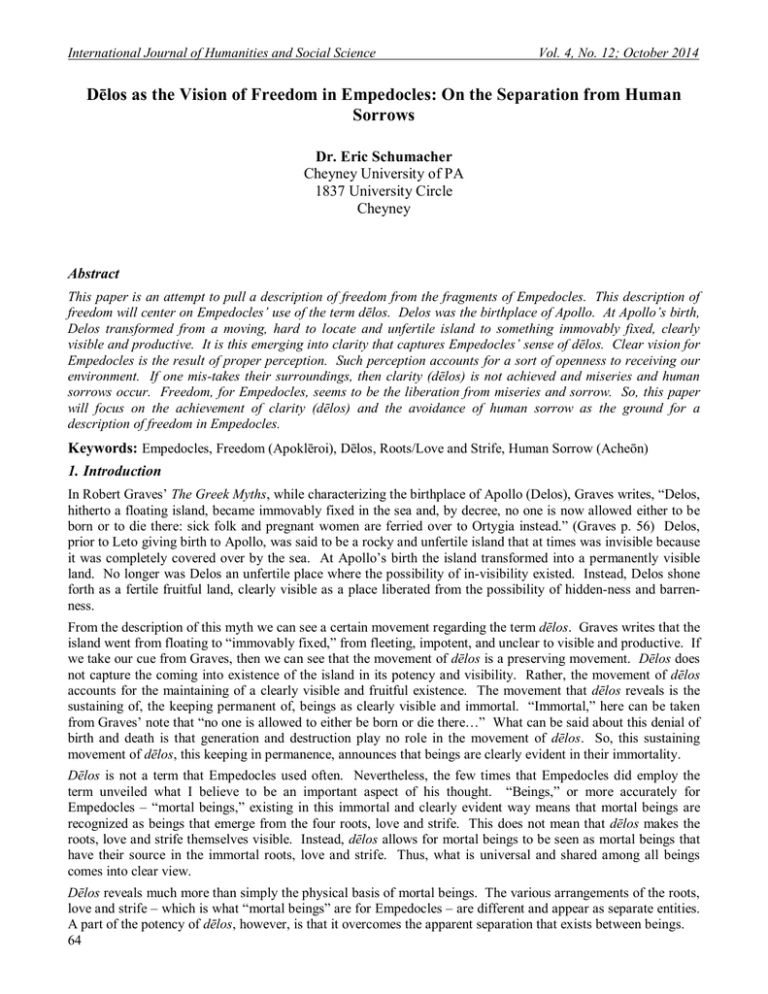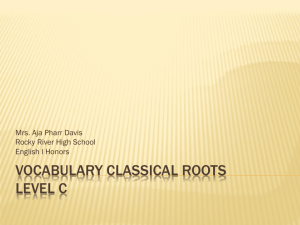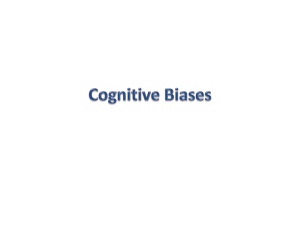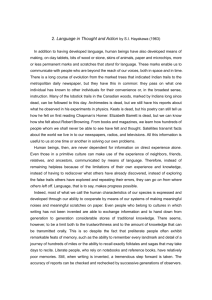Document 10466090
advertisement

International Journal of Humanities and Social Science Vol. 4, No. 12; October 2014 Dēlos as the Vision of Freedom in Empedocles: On the Separation from Human Sorrows Dr. Eric Schumacher Cheyney University of PA 1837 University Circle Cheyney Abstract This paper is an attempt to pull a description of freedom from the fragments of Empedocles. This description of freedom will center on Empedocles’ use of the term dēlos. Delos was the birthplace of Apollo. At Apollo’s birth, Delos transformed from a moving, hard to locate and unfertile island to something immovably fixed, clearly visible and productive. It is this emerging into clarity that captures Empedocles’ sense of dēlos. Clear vision for Empedocles is the result of proper perception. Such perception accounts for a sort of openness to receiving our environment. If one mis-takes their surroundings, then clarity (dēlos) is not achieved and miseries and human sorrows occur. Freedom, for Empedocles, seems to be the liberation from miseries and sorrow. So, this paper will focus on the achievement of clarity (dēlos) and the avoidance of human sorrow as the ground for a description of freedom in Empedocles. Keywords: Empedocles, Freedom (Apoklēroi), Dēlos, Roots/Love and Strife, Human Sorrow (Acheōn) 1. Introduction In Robert Graves’ The Greek Myths, while characterizing the birthplace of Apollo (Delos), Graves writes, “Delos, hitherto a floating island, became immovably fixed in the sea and, by decree, no one is now allowed either to be born or to die there: sick folk and pregnant women are ferried over to Ortygia instead.” (Graves p. 56) Delos, prior to Leto giving birth to Apollo, was said to be a rocky and unfertile island that at times was invisible because it was completely covered over by the sea. At Apollo’s birth the island transformed into a permanently visible land. No longer was Delos an unfertile place where the possibility of in-visibility existed. Instead, Delos shone forth as a fertile fruitful land, clearly visible as a place liberated from the possibility of hidden-ness and barrenness. From the description of this myth we can see a certain movement regarding the term dēlos. Graves writes that the island went from floating to “immovably fixed,” from fleeting, impotent, and unclear to visible and productive. If we take our cue from Graves, then we can see that the movement of dēlos is a preserving movement. Dēlos does not capture the coming into existence of the island in its potency and visibility. Rather, the movement of dēlos accounts for the maintaining of a clearly visible and fruitful existence. The movement that dēlos reveals is the sustaining of, the keeping permanent of, beings as clearly visible and immortal. “Immortal,” here can be taken from Graves’ note that “no one is allowed to either be born or die there…” What can be said about this denial of birth and death is that generation and destruction play no role in the movement of dēlos. So, this sustaining movement of dēlos, this keeping in permanence, announces that beings are clearly evident in their immortality. Dēlos is not a term that Empedocles used often. Nevertheless, the few times that Empedocles did employ the term unveiled what I believe to be an important aspect of his thought. “Beings,” or more accurately for Empedocles – “mortal beings,” existing in this immortal and clearly evident way means that mortal beings are recognized as beings that emerge from the four roots, love and strife. This does not mean that dēlos makes the roots, love and strife themselves visible. Instead, dēlos allows for mortal beings to be seen as mortal beings that have their source in the immortal roots, love and strife. Thus, what is universal and shared among all beings comes into clear view. Dēlos reveals much more than simply the physical basis of mortal beings. The various arrangements of the roots, love and strife – which is what “mortal beings” are for Empedocles – are different and appear as separate entities. A part of the potency of dēlos, however, is that it overcomes the apparent separation that exists between beings. 64 © Center for Promoting Ideas, USA www.ijhssnet.com Dēlos makes the characteristics of mortal beings transparent. In other words, the ontological source of these beings will not be taken as different and unique to each mortal being. Instead, these characteristics are permanent and as such, dēlos presents mortal beings as grounded in what amounts to be Empedocles’primary ontological tier.The primary ontological tier refers to the roots, love and strife; whereas the secondary ontological tier accounts for the mortal arrangements that present themselves as individual beings. So, dēlos shows mortal beings as entailing a shared and immortal ground, namely, the four roots, love and strife. The characteristics of mortal beings, if these beings are not presented by dēlos, appear to be the primary ontological source of the beings themselves. That is, arrangements not presented by dēlos possess characteristics that are mistaken to be the source of the arrangement’s existence. This mistaking of the being’s ontological source plays an important role in Empedocles’ thought. The only possession that a mortal being can actually have is its unique arrangement of the roots, love and strife. Only arrangements are unique – what is being arranged is not. A mortal being does possess certain accidents that separates it from other mortal beings; however, all “accidents” have the same source of existence, which is the same source of existence for the “substance” of the mortal being. So, recognizing that all mortal beings (as well as the “possessions” of mortal beings) have the same source of existence is what dēlos reveals – even though this source is understood in material terms. In fragments 105 and 106 (the numbers of the fragments will correspond to Kathleen Freeman’s translation of Diel’s Fragmente der Vorsokratiker), Empedocles offers what seems to be an identical relationship between thought and blood. Development of this identical relationship will be offered later in this essay; for now, what needs to be recognized is that dēlos is attained into thought/blood. However, thought/blood does not always attain dēlos. That is to say, there are times, perhaps often, when thought/blood does not function appropriately. What “function appropriately” refers to here are those mortal beings that are received through the senses and received into thought but are not received according to dēlos. When thought/blood does not take-in according to dēlos, human sorrows incur. So, at this point we can see that human sorrows (acheōn) are the results of a malfunctioning of thought/blood while dēlos is the result of the proper functioning of thought/blood. In fragment 147, Empedocles offers what will be taken here as a notion of freedom. Freedom, as pulled from this fragment, is not a total liberation for action nor is it a type of political freedom. “Freedom” here essentially refers to what results when thought/blood functions in such a way that dēlos is attained. “Freedom” is, it seems, an appropriate translation of Empedocles’ term apoklēroi. Apoklēroi is defined as “without lot or share of a thing.” (Liddell and Scott p. 99) What apoklēroi frees one from in this fragment is a share in “human suffering.” This “human suffering” is what results from a mis-taking in by the senses which itself prevents the attaining of dēlos. Further development of apoklēroi will be given below. For these early remarks, what is important to see is a developing relationship between dēlos and apoklēroi. Specifically, if dēlos shows mortal beings as clearly evident and immortal, which prevents human sorrows, and apoklēroi characterized one as free from sorrows(acheōn), then dēlos is the vision of apoklēroi. If apoklēroi can be accurately translated as “freedom,” then we can understand dēlos as the vision of freedom. 2. Clarity and Sorrow as the Framework for the Possibility of Freedom In fragment 105, Empedocles writes: (The heart) nourished in the seas of blood which courses in two opposite directions: this is the place where is found for the most part what men call Thought; for the blood round the heart is Thought in mankind. (Freeman translation p. 63) It can be seen in this fragment that Empedocles holds thought and blood to have an intimate relationship. This relationship, which ultimately discloses the identical relationship of thought and sensation, is perhaps best explained by way of effluences. All mortal beings give off effluences that are received by other mortal beings. Effluences are apparently of various forms that fit into channels (pores which extend over the bodies of mortal beings) of like forms. This seems to be Empedocles’ description of sensation. The reason why one can see color yet not smell color is due to the idea that the effluences that color emits do not fit into the pores that lead through the nose. This does not mean that one will never, in a sense, attempt to smell color but it does mean that one will never successfully smell color. As we will see later, this attempt to receive effluences into unlike pores is the mis-taking of thought/blood which leads one to the condition of acheōn.As was stressed above, all mortal beings are simply arrangements of the four roots, love and strife. The effluences that these mortal beings give off are likewise arrangements of the roots, love and strife. 65 International Journal of Humanities and Social Science Vol. 4, No. 12; October 2014 So, what is essentially being received by the pores that extend over the bodies of mortals is itself an arrangement. These arrangements (effluences) are being received through like pores and into the blood stream. Just as the effluences and their receiving pores must be of like “form,” the arrangements of elements that make up the effluences must be received by a like arrangement. The arrangement of elements in the ear, for example, is not like the arrangement of the effluences given off by colors. Thus, no sound is received from color. However, the bloodstream is the best blend of the elements for “mankind.” Consequently, the bloodstream (“blood round the heart”) is able to receive any arrangement of elements, any effluence, due to its receptive blend of elements. In fragment 106, Empedocles writes, “The intelligence of Man grows toward the material that is present.” (Freeman translation p. 63) This present “material” can perhaps be read as the “mortal arrangement that is being sensed.” Though intelligence moves toward the arrangements being sensed, intelligence is not simply dependent on empirical observation for its content. Instead, Empedocles is drawing out a necessary inter-dependent relationship between intelligence and sensation where thought is influenced by the clarity of perception. What we have so far with fragments 105 and 106 is this: (a) intelligence moves in the direction of the arrangements received (sensed); and (b) the bloodstream is the receptive blend of the elements able to “take in” any arrangement of effluences. If we think these two points together, then we can see that the relationship between intelligence and sensation can be characterized as a type of back-and-forth movement. In one direction, the blood’s receptive blend allows for effluences of sensed arrangements to move into the body. In the other direction, thought moves from the body “outward” in that it grows (moves) according to what is present, i.e., sensed. This directionality notes an opposing movement that travels along the same path. This directionality characterizes the intimate relationship that exists for Empedocles between thought and blood. This relationship is so intimate that Empedocles writes of blood as though it is thought itself. Thought and blood are themselves identical. Thus, he concludes fragment 105 by writing, “…blood round the heart is Thought in mankind.” What seems to emerge is an interpretation of the relationship of thought and perception that sees the understanding function according to analogy. That is, what is taken into the blood are the eternal roots that are shared by all of their embodied manifestations. This way, each embodiment is analogically related to all other arrangements. Kamtekar (2009) argues for a similar analogical interpretation of like-by-like knowledge. Even though thought and sensation occur as the penetrating of effluences through like pores, this does not mean that thought and sensation cannot be inaccurate. It is possible for thought to attain an understanding of what is sensed that extends beyond what is actually grasped by the senses. In other words, one may claim knowledge of something that one did not sense, did not receive into the bloodstream. If one did not receive it into the bloodstream, then one did not receive it into thought – since thought and blood are the same. In fragment 2 Empedocles writes: For limited are the means of grasping (i.e., the organs of sense-perception) which are scattered throughout their limbs, and many are the miseries that press in and blunt their thoughts. And having looked at (only) a small part of existence during their lives, doomed to perish swiftly like smoke they are carried aloft and wafted away, believing only that upon which as individuals they chance to hit as they wander in all directions; but every man preens himself on having found the Whole: so little are these things to be seen by men or to be heard, or to be comprehended by the mind! But you, since you have come here into retirement, shall learn – not more than mortal intellect can attain. (Freeman translation p. 51) For this essay, the primary point of interest from fragment 2 is Empedocles’ comment regarding “miseries.” “Miseries” press in and blunt the thoughts of humans. Miseries (translating deil) is what is had when thoughts claim more than they have received. Again, thoughts are identical to the bloodstream; so, we can say that miseries are had when blood claims “more” then it has received. The word “more” is put in quotes here because by claiming the whole one overlooks the ground upon which things exist (roots, love and strife). By overlooking this ground, one attains not “more” but far “less” of an understanding of the world. If receiving effluences through the pores is Empedocles’ description of sense-perception, as was discussed above, then mis-taking what it receives through the pores is an inappropriate functioning of sense-perception. If this s the case, then miseries, of which the “whole” is an example, is the result of an inappropriate functioning of sense-perception.It was mentioned earlier in this essay that an idea of “freedom” for Empedocles can be taken as the separation from and overcoming of acheōn. Acheōn can be translated as “grieving,” “sorrowing,” “human sorrows,” “mourning.” Even though acheōn is not used in fragment 2, I still think Empedocles has the same idea in mind. That is, I believe there is a connection to be drawn between acheōn and deil (miseries). 66 © Center for Promoting Ideas, USA www.ijhssnet.com Deil yields translations of “wretched things,” “afflictions,” “miseries.” The connection that I believe can be drawn here is unique to the thinking of Empedocles. That is, a mortal being is “wretched” if it is improperly received by blood. This is not to say that the mortal being is in itself misery in some value-judgment manner. Instead, mortal beings are miserable because, grasped as such, their primary ontological source is hidden. That is, these beings are not seen as arrangements of roots/love/strifeand they are not received as clearly evident and immortal. They are deil, and as such, they are not dēlos. Acheōn, for Empedocles, seems to be the description of the one who receives mortal beings as deil. In fragment 145, Empedocles writes: Therefore you are distraught with dire sins, and shall never ease your heart of grievous sorrows. (Freeman translation p. 68) What is important to see in this fragment is the presence of dire sins (deilaiōn) and grievous sorrows (acheōn). Empedocles, here, seems to make our connection between these two terms for us. One is not able to overcome acheōn as long as one is “distraught,” mad, thoughtfully burdened, with deilaiōn. It may be best, or at least helpful, to think acheōn simply as human pain, and to think deilaiōn as that which causes pain. This cause of pain, as discussed in fragment 2, is the inappropriate entrance into the bloodstream. Deilaiōn is the mis-taking of mortal being into the bloodstream. This inappropriate entrance blunts thoughts and, as we can see in fragment 145, places one in a state of misery (acheōn). Acheōn is the condition of retaining, possessing deilaiōn. So, the relationship between “sorrows” and “dire sins” can be characterized as source and result of human pain as regards the taking of mortal beings into the bloodstream. It was mentioned earlier in this essay that deilaiōn refers to that which is received through an inappropriate entrance into the bloodstream. As such, deilaiōn is not dēlos. What is meant by this is that dēlos is attained by way of the proper entrance into the blood. “Proper entrance” refers to the clearreception of a mortal being; i.e., as material embodiments of the primary ontological tier (four roots, love and strife). At the end of fragment 3, Empedocles writes: But come, observe with every means, to see by which way each thing is clear, and do not hold any (percept of) sight higher in credibility than (those) according to hearing, nor (set) the loud-sounding hearing above the evidence of the tongue (taste); nor refuse credence at all to any of the other limbs where there exists a path for perception, but use whatever way of perception makes each thing clear. (Freeman translation p. 52) What can be seen in this last part of fragment 3 is two references to dēlos. The first reference is in the first line above. “Observe with every means” can safely be read as referring to the manners of sensation. Earlier in this essay, sensation was characterized as the receiving of mortal beings (their effluences) into the bloodstream (through the pores that extend over the body of the receiving mortal being). Empedocles is suggesting here to “observe,” that is, receive “by which way each thing is clear.” “Each thing” being observed seems to be the mortal beings whose effluences are being received. The “way” to receive “each thing” is whatever way will allow “each thing” to become “clear” (dēlon). So, this first line cited from fragment 3 notes that there is a way of attaining dēlos, a way to receive mortal beings in a clear, evident and appropriate manner. The rest of the above passage tells how to attain dēlos, specifically, by not privileging seeing to be more accurate than hearing, nor tasting more accurate than smelling. Perhaps the reason why Empedocles suggests this is because the various ways of sensing are simply different ways of receiving elemental arrangements into the bloodstream. To privilege one manner of sensation over another would be to privilege one elemental arrangement over another. If an elemental arrangement gets privileged over another, then certain arrangements would be denied and thus not appropriately received. Such limiting would restrict the attaining of dēlon and the entire balance of receptivity would be disturbed. In the last line of fragment 3 from above, Empedocles suggests that one should “use whatever way of perception makes each thing clear.” In addition to not privileging one “way of perception” over another, or perhaps a part of it, is employing the appropriate means of “perception” for the purpose of seeing arrangements clearly. If the proper means of “perception” are used, which results in the elemental arrangement perceived clearly, then (as is written in fragment 3) thoughts will not get blunted. Thoughts will not get blunted because effluences will not press into pores that are not fit to receive them. If effluences, that is, mortal beings, are not inappropriately received, then miseries (deil) will not be had. 67 International Journal of Humanities and Social Science Vol. 4, No. 12; October 2014 If “miseries” (deil), the source of “grievous sorrows” (acheōn), is not received into the bloodstream, then one’s condition will not be characterized by acheōn. So, if we follow this suggested appropriate use of “perception” then one will avoid deilaiōn and, as such, avoid acheōn. If the appropriate, un-privileging function of “perception” yields dēlos and the inappropriate function yields acheōn, then two points can be seen. First, dēlos and acheōn can be thought as opposites. The second point is that dēlos can be thought of as the overcoming of acheōn. That is to say, the appropriate manner of “perception” which presents dēlos is, at the same time, the manner of denying the entrance of “miseries” (deil). Since misery results is grieving sorrows (acheōn), dēlos denying deil also prevents the condition of acheōn. So, dēlos can be thought as the overcoming of acheōn, of human sorrows. 3. A Description of Freedom for Empedocles In fragment 147, Empedocles offers what this essay will take to be the essence of freedom. In this fragment, Empedocles writes: Sharing the hearth of the other immortals, sharing the same table, freed from the lot of human grieves, indestructible. (Freeman translation p. 68) For this essay, a rigorous interpretation of the entire fragment will not be offered. However, there are a few points that can be made about this fragment that will assist our thinking regarding freedom for Empedocles. The term that gets translated here as “freed” is apoklēroi. To be “freed” is to be without a share in something, a separation from lot. But specifically here, the thing that one is without is “human grieves” (acheōn). Freedom is a freedom from human grievance. This fragment speaks of sharing the hearth of immortals. “Hearth” means home, abode, residence. But what do these terms means here? “Hearth” is not the building within which one “lives.” Residence, “hearth,” captures the place – that is, appropriate place – where one resides, dwells. To say that one is “at home” with something says that one is doing what one is familiar and comfortable with doing. That is, one is doing something one is fit to do. Said differently, one is not unfamiliar and out of place while “at home.” So, to speak of “sharing the hearth of the other immortals” essentially refers to dwelling appropriately within the same place as the other immortals. Here, one fits-in “at home” like an effluence into its like pore. One point, then, that can be made regarding this fragment is that being “freed” (apoklēroi), in some way, places one within this appropriate dwelling place; it places one at home. Additionally, Empedocles hints here at the nature of the immortals. Perhaps it is safe to say that immortals illuminate Empedocles’ primary ontological tier (four roots, love and strife). If we think these two points together, then the appropriate dwelling place that one is being placed within by apoklēroi is a residing with Empedocles’ primary ontological tier, a being at home with the roots, love and strife. What this may mean if that this ontological tier is understood as a type of partner within this residence; one with whom this appropriate place is shared. This signifies a share in this ontological tier. In other words, the four roots, love and strife are recognized as the one and shared ground from out of which all mortal beings emerge. To dwell with the gods, freed from sorrow, is the condition attained when we receive, perceiveand think properly; that is, clearly. Apoklēroi, as indicating lacking a share in something, might now be reworked. The “something” that one is without a share in can now be identified as that which prevents one from having a share in the understanding of Empedocles’ primary ontological tier. In other words, apoklēroi announces a separation-from the overlooking of the elemental ground of mortal beings and the presenting of these beings as dēlos. Since all beings, humanity included, are merely arrangements of this ontological tier, receiving beings as dēlon is a becoming-one with this primary tier. That is, dēlon does not simply reveal mortal beings as clearly evident, it reveals mortal beings as being of the same elemental ground as the one receiving these mortal beings. Dēlos, in that it illuminates the shared ground of all mortal beings, presents the dwelling place that all mortal beings have an appropriate share in. Dēlos brings forth the hearth that Empedocles speaks of in fragment 147. Sharing the hearth with the immortals occurs when one receives the mortal arrangements into the bloodstream by whatever means makes the arrangements clear. Receiving mortal beings into the blood was discussed above as the act of sense-perception. Apoklēroi, in that it prevents one from overlooking the elemental ground of mortal beings, can perhaps be understood in this fragment as the characterization of the condition of appropriately senseperceiving. Appropriate perception, as discussed earlier, results in the attaining of dēlos. 68 © Center for Promoting Ideas, USA www.ijhssnet.com Dēlos, as was also discussed earlier, is the overcoming of and denial of “sorrows” (acheōn). Soapoklēroi, then, can perhaps be understood as the condition of denying acheōn – which in fragment 147 suggests results in sharing a home with immortals. 4. Conclusion At this point, we can begin to tie together some of our themes. Dēlos has been presented not simply as the clear perception of an object but more importantly as appropriate perception. “Appropriate” because beings are received as dēlon when they are taken into the bloodstream in such a way that thoughts are not “blunted.” Blunted thoughts, or the mis-taking of beings into the blood, results in human sorrows. Human sorrows (acheōn), it is been discussed, are not just “miseries [deil] that press in and blunt” thoughts, but the very condition for the possibility of receiving such miseries. So, if acheōn is the condition of mis-taking beings into the bloodstream and dēlos is the condition of appropriately sense-perceiving, the dēlos and acheōn are opposing conditions. Apoklēroi speaks to the difference between these two conditions in such a way that it creates, in a sense, a third condition. This third condition of apoklēroi is the condition of withdrawal from the condition of acheōn to the condition of dēlos. Apoklēroi liberates one from a painful existence and allows one to return home and exist with its like members. Apoklēroi withdrawals from a miserable understanding that enables one to incorrectly behold the whole of existence and grants one the ability to take into the bloodstream beings as dēlon. Thus, grasping beings in their immortality makes mortals share their dwelling with the immortals. As seen earlier in the essay’s discussion of fragment 147, apoklēroi separates one from acheōn and, as such, escorts one home to be with one’s like elements. Sharing “home” with like elements – which characterizes appropriate sense-perception – is being freed from human sorrow. The understanding of this home-life is had through the receiving of dēlos. What is received in this condition of being freed from sorrow is dēlos. Therefore, dēlos can be understood as the vision of freedom. Bibliography Barnes, J. (1987). Early Greek Philosophy. London: Penguin Books. Diels, H. (1954). Fragments der Vorsokratiker. Berlin: Weidmannsche Verlagsbuchhandlung. Freeman, K. (1966). Ancilla to the Pre-Socratic Philosophers (A Complete Translation of the Fragments in Diels, Fragmente der Vorsokratiker). Cambridge, MA: Harvard University Press. Grant, M. (1962). Myths of the Greeks and Romans. London: Penguin Books. Graves, R. (1992). The Greek Myths. London: Penguin Books. Inwood, B. (2001). The Poem of Empedocles. Toronto: University of Toronto Press. Kamtekar, R. (2009). Knowing by Likeness in Empedocles. Phronesis, 215-238. Lambridis, H. (1976). Empedocles: A Philosophical Investigation. Tuscaloosa, AL: The University of Alabama Press. Lloyd, G. (1966). Polarity and Analogy: Two Types of Argumentation in Early Greek Thought. Cambridge: Cambridge University Press. O'Brien, D. (1969). Empedocles' Cosmic Cycle. Cambridge: Cambridge University Press. Raven, G. K. (1981). The PreSocratic Philosophers. New York, NY: Cambridge University Press. Scott, L. a. (1977). Greek-English Lexicon (7th edition). Oxford: Clarendon Press. Stratton, G. M. (1917). Theophrastus and the Greek Physiological Psychology Before Aristotle. New York: The Macmillan Company. Wright, M. R. (1995). Empedocles: The Extent Fragments. Indianapolis: Hackett Publishing Company, Inc. 69








